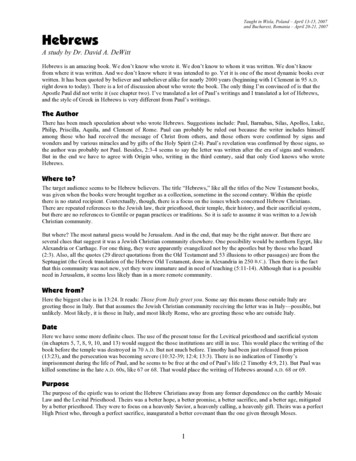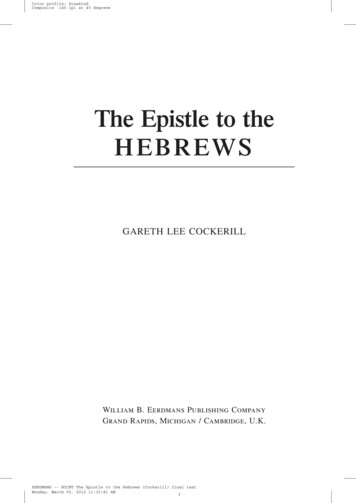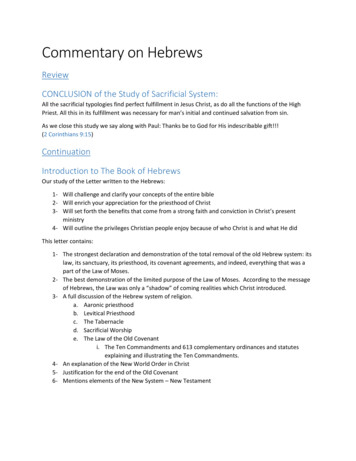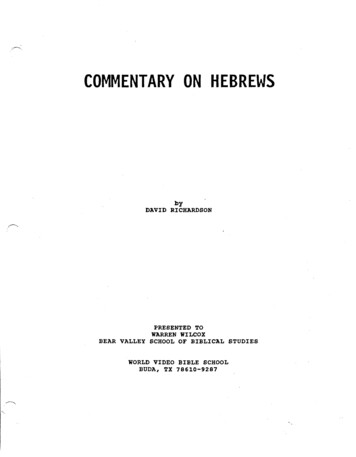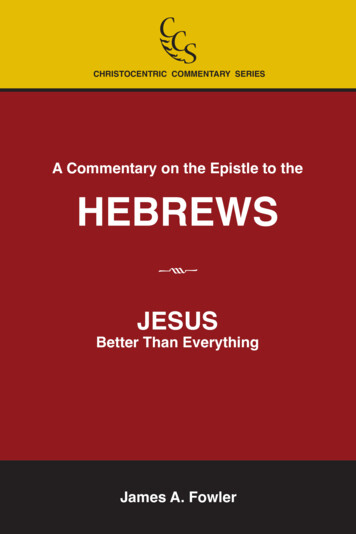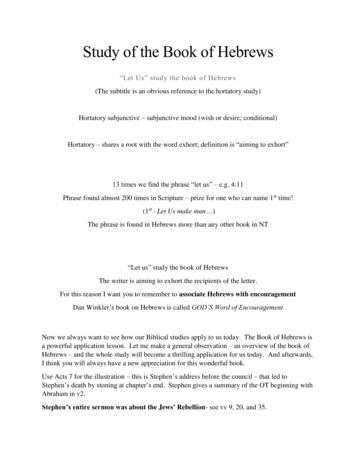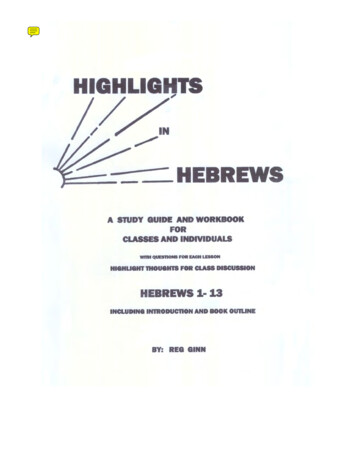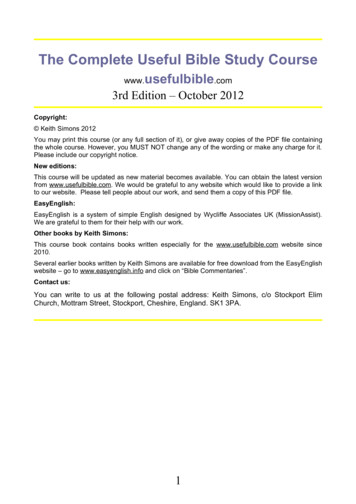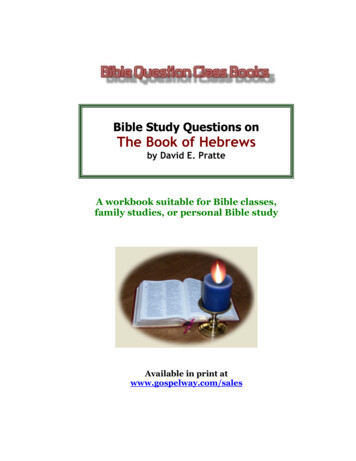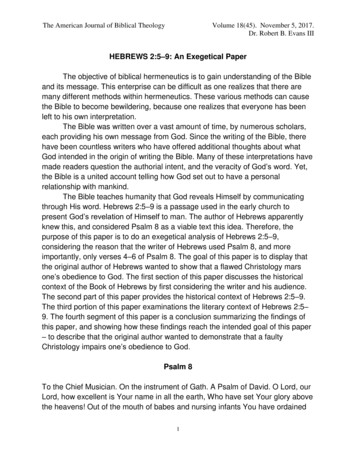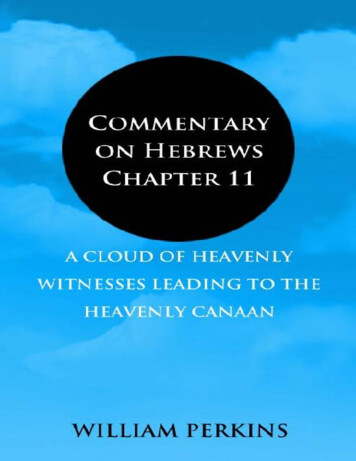
Transcription
COMMENTARYONHEBREWSCHAPTER 11A CLOUD OF HEAVENLY WITNESSESLEADING TO THE HEAVENLY CANAANOR A COMMENTARY UPON THEELEVENTH CHAPTER OF THE EPISTLETO THE HEBREWSBY WILLIAM PERKINS
CONTENTS1 Now faith is the substance of things hoped for, theevidence of things not seen.2 For by it the elders obtained a good report.3 Through faith we understand that the worlds wereframed by the word of God, so that things which areseen were not made of things which do appear.4 By faith Abel offered unto God a more excellentsacrifice than Cain, by which he obtained witness thathe was righteous, God testifying of his gifts: and by ithe being dead yet speaketh.5 By faith Enoch was translated that he should not seedeath; and was not found, because God had translatedhim: for before his translation he had this testimony,that he pleased God. 6 But without faith it isimpossible to please him: for he that cometh to Godmust believe that he is, and that he is a rewarder ofthem that diligently seek him.7 By faith Noah, being warned of God of things not
seen as yet, moved with fear, prepared an ark to thesaving of his house; by the which he condemned theworld, and became heir of the righteousness which isby faith.8 By faith Abraham, when he was called to go out intoa place which he should after receive for aninheritance, obeyed; and he went out, not knowingwhither he went.9 By faith he sojourned in the land of promise, as in astrange country, dwelling in tabernacles with Isaac andJacob, the heirs with him of the same promise: 10 Forhe looked for a city which hath foundations, whosebuilder and maker is God.11 Through faith also Sara herself received strength toconceive seed, and was delivered of a child when shewas past age, because she judged him faithful who hadpromised.12 Therefore sprang there even of one, and him asgood as dead, so many as the stars of the sky inmultitude, and as the sand which is by the sea shoreinnumerable.13 These all died in faith, not having received the
promises, but having seen them afar off, and werepersuaded of them, and embraced them, and confessedthat they were strangers and pilgrims on the earth.14. For they that say such things declare plainly thatthey seek a country. 15 And truly, if they had beenmindful of that country from whence they came out,they might have had opportunity to have returned. 16But now they desire a better country, that is, anheavenly: wherefore God is not ashamed to be calledtheir God: for he hath prepared for them a city.17 By faith Abraham, when he was tried, offered upIsaac: and he that had received the promises offered uphis only begotten son, 18 Of whom it was said, Thatin Isaac shall thy seed be called: 19 Accounting thatGod was able to raise him up, even from the dead;from whence also he received him in a figure.20 By faith Isaac blessed Jacob and Esau concerningthings to come.21 By faith Jacob, when he was a dying, blessed boththe sons of Joseph; and worshipped, leaning upon thetop of his staff.22 By faith Joseph, when he died, made mention of
the departing of the children of Israel; and gavecommandment concerning his bones.23 By faith Moses, when he was born, was hid threemonths of his parents, because they saw he was aproper child; and they were not afraid of the king'scommandment.24 By faith Moses, when he was come to years,refused to be called the son of Pharaoh's daughter; 25Choosing rather to suffer affliction with the people ofGod, than to enjoy the pleasures of sin for a season;26 Esteeming the reproach of Christ greater richesthan the treasures in Egypt: for he had respect unto therecompence of the reward.27 By faith he forsook Egypt, not fearing the wrath ofthe king: for he endured, as seeing him who isinvisible.28 Through faith he kept the passover, and thesprinkling of blood, lest he that destroyed the firstbornshould touch them.29 By faith they passed through the Red sea as by dryland: which the Egyptians assaying to do weredrowned.
30 By faith the walls of Jericho fell down, after theywere compassed about seven days.31 By faith the harlot Rahab perished not with themthat believed not, when she had received the spieswith peace.32 And what shall I more say? for the time would failme to tell of Gedeon, and of Barak, and of Samson,and of Jephthae; of David also, and Samuel, and of theprophets:33 Who through faith subdued kingdoms, wroughtrighteousness, obtained promises, stopped the mouthsof lions, 34 Quenched the violence of fire, escaped theedge of the sword, out of weakness were made strong,waxed valiant in fight, turned to flight the armies ofthe aliens. 35 Women received their dead raised to lifeagain: and others were tortured, not acceptingdeliverance; that they might obtain a betterresurrection:36 And others had trial of cruel mockings andscourgings, yea, moreover of bonds andimprisonment: 37 They were stoned, they were sawnasunder, were tempted, were slain with the sword:they wandered about in sheepskins and goatskins;
being destitute, afflicted, tormented;38 (Of whom the world was not worthy:) theywandered in deserts, and in mountains, and in densand caves of the earth. 39 And these all, havingobtained a good report through faith, received not thepromise: 40 God having provided some better thingfor us, that they without us should not be madeperfect.12:1 Wherefore seeing we also are compassed aboutwith so great a cloud of witnesses, let us lay asideevery weight, and the sin which doth so easily besetus, and let us run with patience the race that is setbefore us
“Now faith is the substance of things hoped for, the evidence of things notseen.” Hebrews 11:1.Concerning faith, two points are necessary to be known of every Christian:the doctrine and the practice of it. The whole doctrine of faith (beinggrounded and gathered out of the Word of God) is comprised in the Creed,commonly called the Apostles’ Creed, which being already by usexpounded, it followeth in order (next after the doctrine) to lay down alsothe practice of faith: for which purpose we have chosen this eleventhchapter to the Hebrews as being a portion of scripture wherein the saidpractice of faith is most excellently and at large set down.This chapter depends on the former thus: We may read in the formerchapter that many Jews, having received the faith and given their names toChrist, did afterward fall away; therefore towards the end of the chapterthere is added a notable exhortation tending to persuade the Hebrews topersevere in faith unto the end, as also to suffer patiently whatever shallbefall them in the profession of it. And to urge the exhortation, there aredivers reasons, not needful to be alleged, for they concern not the presentpurpose.Now, in this chapter, he continues the same exhortation; and the wholechapter (as I take it) is nothing else in substance but one reason to urge theformer exhortation to perseverance in faith; and the reason is drawn fromthe excellency of faith: for this chapter doth divers ways set down what anexcellent gift of God faith is. His whole scope therefore is manifest to benothing else but to urge them to persevere and continue in that faith,proved at large to be so excellent a thing; and indeed he could not bring abetter argument to move them to love and hold fast their faith, than bypersuading them of the excellency of it. For common reason bids us notonly choose, but hold fast that that is excellent.Out of this coherence, we may learn, in a word, that perseverance in faithis a matter not of ordinary necessity, nor of mean excellency, to the urging
whereof the author of this epistle useth so large and so forcible anexhortation insomuch as, whereas ordinary exhortations occupy the roomof one or some few verses, this is continued through divers chapters.The parts of this whole chapter are two:1. A general description of faith, vv. 1-4.2. An illustration or declaration of that description, by a large rehearsal ofmanifold examples of ancient and worthy men in the Old Testament, vv. 4to the end.Of these two in order:The description of faith consists of three actions or effects of faith, setdown in three several verses:The first effect in the first verse. Faith makes things which are not (butonly are hoped for) after a sort to subsist and to be present with thebeliever.The second is in the second verse. Faith makes a believer approved ofGod.The third in the third verse. Faith makes a man understand and believethings incredible to sense and reason.Of these in order.Now faith is the ground of things which are hoped for: and the evidence ofthings which are not seen.This first verse contains the first effect in the description of faith, whereinfirst let us see the true meaning of the words; secondly, what instructionsthey do naturally yield unto us.I. For the meaning, we must examine the words severally.Now faith.
Faith in the Word of God is specially of three sorts: Historical, miraculous,and justifying or saving faith.1. Historical faith is not only a knowledge of the Word, but an assent of theheart to the truth of it; and this faith is general not only to all men, goodand bad, but even to the devils themselves, James 2:19, Thou believestthere is one God, thou doest well: the devils also believe it, and tremble.Now he that will believe out of the scripture there is one God, he willbelieve historically anything in the scripture.2. Miraculous, or the faith of miracles, which is an inward persuasion ofthe heart, wrought by some special instinct of the Holy Ghost in someman, whereby he is truly persuaded that God will use him as hisinstrument for the workingof some miracles: this also is general, both toelect and reprobate. Judas had it with the rest of the Apostles.3. Saving (commonly called justifying) faith, which is special persuasionwrought by the Holy Ghost in the heart of those that are effectually called,concerning their reconciliation and salvation by Christ.Of these three sorts of faith, the third is principally meant in this place.And although in the description, and over all the chapter, there are somethings that agree to other faith than it, yet I say the general scope in thischapter is principally of that faith that saves a man. It becomes ustherefore to learn carefully the instructions that concern the practice ofthis faith, for it is no less than saving faith.Secondly, it is said that this faith is the ground, or substance, for the Wordsignifies both.The meaning is that things hoped for, as yet are not, and so have no beingnor substance. Now faith that believes the promises and applieth them;that faith gives to those things which yet are not (after a sort) a substanceor subsistence in the heart of the believer; so that that thing which neverhad, nor yet hath a being in itself, by this faith hath a being in the heart ofthe believer; this I take to be the true meaning.
Thirdly, it followeth of what things this faith is the ground or substance,namely, of things hoped for, or, and things not seen. And these be of twosorts: either in regard of the fathers of the Old Testament alone, or of themand us both.Of the first sort were these two: 1. The incarnation of Christ. 2. Thepublishing of the gospel, both to Jew and Gentile in a glorious manner:both these were hoped for of them, but we have seen them. To them theyhad a being only in faith, to us a being in themselves.Now unto the fathers of the Old Testament, their faith gave these twothings a being in their hearts and souls, though they came not to pass manyhundred years after.There are other things which we hope for as well as they, which are tocome, and not seen in respect of us both; and they be six:1. Justification, standing in the remission of sins.2. Sanctification in this life.3. The perfection and accomplishment of our sanctification after this life.4. The Resurrection of the body, and reuniting it with the soul.5. Glorification of body and soul.6. Life everlasting, and glory with God in heaven.These they saw not with the eye of the body, neither do we; yet they hopedfor them, and so do we. They had no being in themselves to them, neitherhave they as yet to us; but this true saving faith gave to them, gives to us,and will give to every believer, whilst the world lasteth, such a certainassurance of them that they seem present unto us, and we seem presentlyto enjoy them. We cannot enjoy any of them fully, but saving faith haththis power to give them all a present being in our hearts, and us such a realpossession of them as greatly delighteth a Christian soul, insomuch as the
feeling of the sweetness of this glory, though it be to come, overwhelmeththe feeling of a worldly misery, though it be present.Fourthly, it is added, And the evidence.This word signifieth and teacheth us two things concerning faith:1. Faith is an evidence, that is, faith so convinces the mind, understandingand judgment as that is cannot but must needs, yea, it compelleth it byforce of reasons unanswerable, to believe the promises of God certainly.2. It is an evidence, that is, whereas life everlasting and all other thingshoped for are invisible, and were never seen of any believer since theworld began, this saving faith hath this power and property: to take thatthing in itself invisible and never yet seen, and so lively to represent it tothe heart of the believer, and to the eye of his mind, as that after a sort hepresently seeth and enjoyeth that invisible thing and rejoiceth in that sightand enjoying of it; and so the judgment is not only convinced that such athing shall come to pass, though it be yet to come, but the mind (as far asGod’s Word hath revealed, and is able) conceives of that thing as beingreally present to the view of it.Let one example serve for all: Life everlasting is a thing hoped for. Nowfaith, not only by infallible arguments grounded upon the Word andpromise of God, convinceth a man’s judgment that it shall come to pass(insomuch as he dare say that he knoweth certainly there is life everlastingas that he liveth and moveth), but this faith also (as much as God’s Wordhath revealed, and as far forth as the mind of man is able to conceive of it)so representeth this life everlasting to the eye of the soul as that the souldoth seem to apprehend and enjoy this life everlasting; yea, and often insuch measure as that he condemneth the world, and all the present felicityof it, in comparison of that measure of the joys thereof, which faithrepresenteth to his soul; and thus faith makes that present which is absent,and makes that manifest and visible which in itself is invisible – invisibleto the eyes of the body, it makes visible to the eye of the soul; the sight ofwhich eye is both given and continued, and daily sharpened by savingfaith. And thus faith is a most excellent evidence of things not seen. Sothen, the whole sum of this first effect is briefly thus much: whereas
things to be believed, as perfection of sanctification, resurrection,glorification etc. are not yet seen, neither can be, in that they are not yetcome to pass; yet if a man have grace certainly to believe the promises ofGod, these things shall have a being to his soul, in that both his judgmentknoweth assuredly they shall come to pass, and his soul in most lively andjoyful representations seemeth to enjoy them.Hitherto the meaning of the first effect.II. Now in the second place, let us see what instructions this first effectthus unfolded doth minister to us.First, whereas faith gives a substance and being to things that are not, welearn that the fathers in the Old Testament that lived before the incarnationof Christ, were truly partakers of the body and blood of Christ.If any allege that this is strange, considering that Christ had then no bodyand blood, neither had He any until the Incarnation; and how then couldthey receive that which then was not?I grant it is true that they then had no being, and yet the father receivedthem. But how can this be? I answer, by the wonderful power of savingfaith, which makes things that are not in nature, to have in some sort abeing and subsistence: and so was Christ (though He was to come) presentto the believers of the old time. For, Rev. 13:8, Christ is a lamb slain fromthe beginning of the world: that is, slain as well then as now: and that notonly in the counsel and decree of God whereby He is born and slain in alltimes and places; not only in regard of the eternal power, efficacy an meritof His death; but also even in respect of the heart of the believer, whosefaith makes that that is locally absent, after a sort truly and really present;even so also is Christ a Lamb slain from the beginning of the world.See a plain demonstration hereof in John 8:56, Abraham saw me (saithChrist) and rejoiced. How could this be, when as Christ was not born of athousand years after? Answer: This could not be in reason , but it wasindeed to Abraham’s faith whereby he saw Christ more lively and more tohis joy and consolation so many hundred years after he was than many thatlived in Christ’s time, and saw Him, and heard Him, and conversed with
Him; for they living with Him, yet were as good as absent from Himbecause they believed not in Him. And Abraham, though Christ was so farfrom him, yet by his faith was present with him. Again, 1 Cor. 10:3, theancient, believing Israelites ate the same spiritual bread, and drank thesame spiritual rock, and that rock was Christ. How could they eat anddrink Christ so long before He was? I answer, they did it by reason of thatwonderful power of faith, which makes a thing absent present to thebeliever. By that faith they received Christ, as lively, as effectually, asmuch to their profit and comfort, as we do since His coming.If any man ask, how could their faith apprehend that that then was not? Ianswer, by giving them interest and title to it; and so the fathers are saidby faith to have received Christ because their faith gave them right andtitle in Christ, and in their hearts they felt the efficacy of His death andresurrection, whereby they died to sin and were renewed in holiness, aswell as we are now by the same efficacy.Secondly, whereas faith makes things absent present:Here they are confuted that teach that the Lord’s Supper is no Sacramentunless the bread and wine be either truly turned into the body and blood ofChrist, or at least be they be in or about the bread; and that so he is locallypresent and must locally and substantially be received; and this (say they)is the most comfortable receiving of Christ; for what comfort is it toreceive one absent? But these men know not this notable prerogative oftrue faith: Faith gives being to things which are not, and makes thingspresent which are absent; they therefore that will have Christ locallypresent, they take this noble prerogative from faith, for here is nothingabsent which faith should make present; we need not go in this Sacramentto require a corporal presence: it is sufficient if we have true faith; for thatmakes Him present much more comfortably than it might be his bodilypresence would be unto us.If any man ask, How can this be? I answer, The faith of the receiverknoweth best; and yet reason can say something in this case: for suppose aman look earnestly upon a star; there are many thousand miles betwixt hiseye and the star, yet the star and his eye are so united together as that thestar is after a sort present to his eye. So if we regard local distance, we are
as far from Christ as earth is from heaven; but if we regard the nature offaith which is to reach itself to Christ, wherever He be, in that regardChrist is present: and why should not this be so? For if the bodily eye, sofeeble and weak, can reach so far as to a star, and join it to itself, and somake it present; why should not much more the piercing eye of the soulreach up to Christ, and make Him present to the comfortable feeling ofitself?Thirdly, here we learn how to behave ourselves in a strange temptationwhereby God useth to exercise His children. The Lord, after that He hathreceived His children into His favour, continueth not always to manifestthat favour unto them, but oftentimes puts back the feeling of it for a time,then afterward, He may shew it again in more comfortable manner untothem, and that they may afterward more sensibly feel it, and moreearnestly love it, and more carefully labour to keep it, when they have it.Now for the time of this eclipse of the favour of God, He not onlydarkeneth His love, but makes them also feel such a measure of His wrathas that they will often think themselves castaways from the favour of God.David and Job were often exercised with this temptation, as appeareth bytheir most lamentable and bitter complaints; yea, David doubts not (Psa.77:9) to challenge the Lord that He hath forgotten to be gracious, and hathshut up His lovingkindness in displeasure. And Job (Job 15:26) complainsto the Lord that He writeth bitter things against him, and makes him topossess the sins of his youth; words, as it may seem, of men forsaken ofGod; and indeed so for that time they thought of themselves. If it pleasethe Lord thus to deal with us, so as we feel nothing else but His wrathwrestling with our consciences, neither can think otherwise by presentfeeling, but that God hath forsaken us; what should we do in this pitifulcase? Should we despair, as reason would bid us? No, but take this course:Call to mind God’s merciful promises, and His ancient former love; andcast thyself upon that love, though thou canst not feel it. When thou hastmost cause to despair, then labour against it. When thou hast no reason tobelieve, then believe with all thy power. For remember the power andprerogative of thy faith: it believes not things that are, and manifestlyappear, so much as such things that are not, and have no being. So then,when God’s favour seems to be lost, and have no being to thee, then God’s
favour is a fit object for thy faith, which believes these things that are not.Let all the devils in hell set themselves against thy poor soul, and if thouholdest fast this faith, they cannot all make thee sink under it: for when thedevil saith, “Thou hast lost God’s favour”; by faith a man answereth,“Though God’s favour be lost unto my feeling, yet to my faith it is not: myfaith gives it a being, and so long (say what thou wilt) I will never fear thatit is lost.” When God pulls back His favour, and fights against thee withHis wrath, do as Jacob did (Gen. 32:27,29), wrestle with God, though thouhave but one leg; that is, though thou have but one little spark of faith,fight with that little faith, lay hold by it on God, and let Him not go untilHe hath blessed thee, in turning again unto thee His favourablecountenance; and say with Job (Job 13), even in the very heat of thytemptation, O Lord, though thou kill this body and flesh of mine, yet will Itrust in thee for everlasting life: yea, and though God’s anger should seemto increase, yet for all that take faster hold and faint not; for faith willnever fail thee: it will restore God’s love when it seems lost; it will set itbefore thine eyes when it seems to be hid. For mark well but this onereason: if faith will give life everlasting a being, and make it present to thysoul, which indeed never had being to thee; how much more can it give abeing to God’s favour and make it present to thy soul, which once had, andindeed hath still a being, and was never lost indeed, but only to a man’sfeeling? Thus, true faith is able to answer this temptation, whether itcomes in life or in the pangs of death.Fourthly, whereas faith is called an evidence, hence we learn that thenature of faith stands not in doubting, but in certainty and assurance. TheRomish doubting of the essence of faith is as contrary to true faith asdarkness to light: for faith is an evidence of things hoped for, that is, itconvinceth the judgment by infallible arguments; knowing as certainly thetruth of the promises and for the things hoped for, as that God is God. ButRome will needs join faith and doubting, which indeed fight like fire andwater, and can never agree together in every respect, but one will in theend destroy the other.Objection. But it seemeth doubting is a part or at least a companion offaith, for we doubt as well as believe; and who is so faithful as doubtethnot? Answer. We do so, but what then? We should not, for God commands
us to believe and not to doubt; therefore to believe, because it iscommanded of God, is a virtue; and if it be a virtue, then to doubt is avice; faith and doubting are both in a good man, but faith is a work ofgrace and of the Spirit; doubting is a work of the flesh, and a piece of thecorruption of the old man.Fifthly, if faith be a substance of things hoped for, much more is it asubstance to the believer: if it gives those things a being which are out ofhim, much more doth it give a permanent being unto the believer himself,strengthening him to stand and continue in all assaults. So Heb. 7:14 –faith is that whereby a believer is sustained and upheld, so that indeed wemay fitly say, Faith is the spiritual substance and the spiritual strength of aChristian man, and according to the measure of his faith, such is themeasure of his spiritual strength.This consideration hath divers comfortable uses, but especially two: 1.When any of us are out of the reach of a temptation, so long are weconfident of our own strength: but when we are assaulted by the devil, theworld and our own flesh, then we shall find that to resist is an hardermatter than we dreamed of; for, as possible as it is for water to burn, orfire to put out itself, so possible is it for us of ourselves to resist sin,insomuch as it is a thousand to one, but that at every assault our natureyields. Now if it be so hard to rule over one sin, how shall we do againstthat sea of temptations that overwhelm a Christian life? This doctrineteacheth thee how, namely, to stick to thy faith, and it will do for thee: forif it be the substance of things thou hopest for, which yet never were;much more will it yield unto thee spiritual strength and substance to makethee stand in all temptations. When thou art tempted, then call to mindGod’s promises, believe them, that is, apply them to thyself, and beresolved that they were made, and shall be performed even to thee: thenthough thou have no more power of thyself than fire hath to cease to burn,yet, whilst thou doest thus, thou shalt feel thy soul spiritually strengthenedagainst all temptations: and feeling the experience of this, deny them thineown strength, and magnify the power that God hath given unto true faith.Again, though now we are most of us quiet, under our own vines and figtrees, yet we know not how soon the hand of the Lord may be upon any of
us, in poverty, sickness, imprisonment, banishment, losses, famine, or howit pleaseth Him; how shall a poor Christian stand and buckle himself tobear these? I answer, true saving faith, resting on the Word of God, andbelieving the promises, not formally, but truly, will put such substantialspiritual strength into him, as that at first, though he bow under it, yetshall he be able to recover himself again and buckle himself to goforwarding his profession, and shall follow Christ manfully with this hiscross. This wonderful power hath God given to saving faith, both to resisttemptations and to undergo all crosses.And thus much of the first action, or effect, of faith.
“For by it the elders obtained a good report.” Hebrews 11:2This verse containeth the second effect of saving faith: which is, that faithis a means whereby a believer is approved of God.This verse hath special relation to the fifth verse, for that that is said hereof all the elders in general, is there affirmed specially of Enoch; namely,that he was reported as to have pleased God.Let us first search the true meaning of the words.Elders.That is, all such men as living under the Old Testament, believed in Christ;amongst which (though all be understood) yet some were more excellentin faith and obedience than others, and so more honourable and of higherestimation with God and men; and of them it is specially to be understood.Now concerning these elders, it is further said that they were well reportedof. Hereby are meant three things:1. That God approved and allowed of them.2. That God did approve of them because of their faith in the Messiah.3. That God gave a testimony, and declared that He approved of them.I. For the first, it may be asked, How were they approved of God? Answer:Christ the Son of God is He in whom the Father is well pleased. Now theybelieving in Christ, their sins were laid on Him, and made His byimputation: and contrariwise, His holiness, obedience and satisfactionwere imputed to them, and by the same imputation were made theirs. Now,that being theirs, God being so well pleased with Christ, could not but alsofor Christ’s sake approve of them. If this seem hard unto any, I make itplain by this comparison: Look as Jacob, a younger brother, puts on Esau’s
garment, the elder brother, and in it was taken for Esau, and obtained hisfather’s blessing and patrimony, which by himself he could not have got;even so we are as younger brethren, Christ is our elder brother; we have noright nor title to our father’s blessing, nor to the kingdom of heaven. Wemust put on the robe of perfect righteousness, which is the garment ofChrist our elder brother. We, standing clothed with it, purchase ourFather’s favour, and with His favour His blessing, and His blessing is theright and title to everlasting life. And thus by Christ they were approved.II. Secondly, for what were they approved? The text saith: By faith; notbecause faith is an action of a sanctified mind and a good grace of God;for so are humility, love, fear of God (all which are graces of thesanctifying spirit, as faith is); but because it is a worthy instrument in theheart of the believer which apprehe
COMMENTARY ON HEBREWS CHAPTER 11 A CLOUD OF HEAVENLY WITNESSES LEADING TO THE HEAVENLY CANAAN OR A COMMENTARY UPON THE ELEVENTH CHAPTER OF THE EPISTLE TO THE HEBREWS BY WILLIAM PERKINS. CONT E NT S 1 Now faith is the substa
